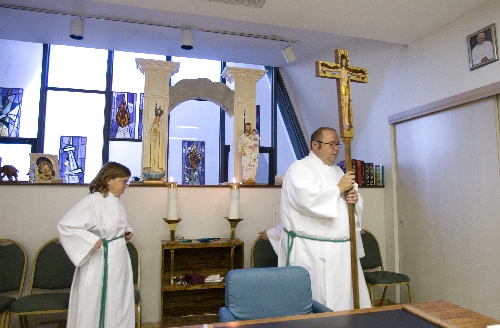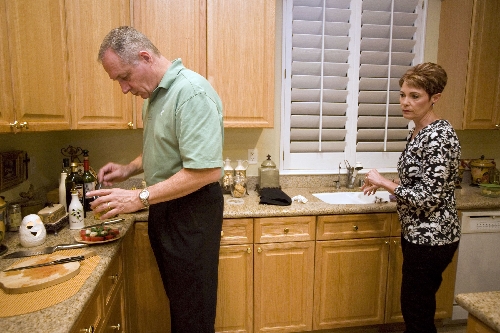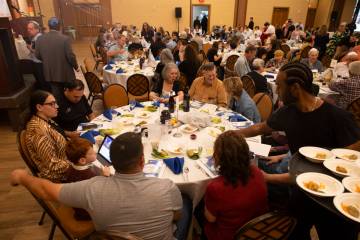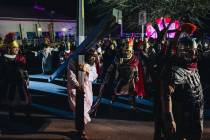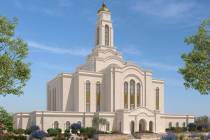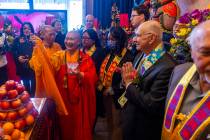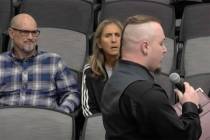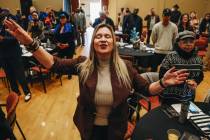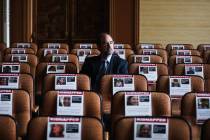Permanent diaconate offers level of service to Catholics short of priesthood
Come next spring, at least a few Southern Nevada Catholics may be a bit confused about some of the new faces they'll be seeing around the parish.
The guy who preaches a homily during Mass and then, afterward, gives his wife a peck on the cheek. Or, maybe, the guy who presides at a wedding or baptism and then heads out to his kids' Little League game.
Relax. You won't be witnessing the fruits of some supersecret Vatican III. You'll just be meeting members of the Diocese of Las Vegas' first class of permanent deacons.
The permanent diaconate isn't a new, or even little-known, structure within the Catholic Church. Catholics who have moved here from older dioceses probably have met permanent deacons at their former parishes, and the Las Vegas diocese already is home to both permanent deacons ordained elsewhere and seminarians who serve as deacons before being ordained as priests.
But when the Las Vegas diocese's inaugural class of permanent deacons is ordained on June 3, they'll augment the diocese's corps of priests in ways that they could not as laymen.
For instance, they'll be able to preside at weddings and baptisms. In parishes without pastors, they can serve as parish administrators. And, they'll be able to preach homilies, with the consent of parish pastors, and serve in such ministries as chaplaincies.
In fact, it's probably easier to note the things permanent deacons can't do, namely: Consecrate the Eucharist or say Mass, hear confession or grant absolution, and anoint the sick -- formerly known colloquially as administering last rites -- all of which are the province of priests.
And, the most visible thing parishioners will notice about permanent deacons: Some of them will be married. However, deacons who are unmarried at the time of their ordination must remain unmarried, while married deacons may not remarry if they should become single.
Patrick Cater, one of the diocese's charter permanent deacon candidates, moved to Las Vegas about six years ago from the Cleveland area where, he notes, "the (permanent) diaconate is thriving."
In fact, Cater says seeking ordination as a permanent deacon is something "I had always considered ... in the back of my mind."
When he moved here -- because of, Cater explains, a better economy here and a desire to escape harsh winters there -- Cater didn't know that the diocese was preparing to create a permanent diaconate. But in 2005, and after, he says, "a lot of soul-searching and a lot of praying," he applied.
A vocation to the diaconate is just like any other ministerial calling, Cater explains. And, like any other ministerial calling, it can be, at least initially, intimidating.
"I don't know if 'scary' is the right word," Cater says, but the prospect of being ordained was "overwhelming at the time."
"I have to think," he says, that "there was a little Divine Providence at work."
Bob Rudloff moved from New Jersey to Las Vegas in 1998 after being recruited by an accounting firm here. He spent 5½ years with that firm before joining MGM Resorts International, where he is the company's vice president of internal audit.
"I always knew I was being called to something," Rudloff says, "but I knew it wasn't a priest."
Then, in the early '80s, after he had married and begun to raise a family, Rudloff learned about the permanent diaconate. It was then, he says, that "everything clicked in my mind. That was what I was meant to do."
Cater, who works in security at the Suncoast, says deacons are "the face of the church in the secular world, which is why you'll find most permanent deacons working in secular jobs."
Las Vegas' diaconate candidates began their five-year-long course of preparation with two years of lay ministry training, followed by three years of study devoted specifically to the diaconate. They study Scripture and the sacraments, as well as such topics as effective preaching, canon law, ministerial ethics and pastoral policies.
There are classes to take, papers to write, assignments to complete and retreats to be taken throughout the process, Rudloff says.
And, Cater notes, that's on top of whatever other commitments -- as lectors, eucharistic ministers, Mass servers -- candidates already have at their own parishes.
Cater says that while he had no particular expectation of what the process would be like, "I don't think I was prepared for the amount of work that was dumped in our laps."
He laughs. "I joked with my wife when we were going through the second phase of the application process: 'Do you realize I could have "Doctor" in front of my name for the same amount of time?' "
For many parishioners unfamiliar with the permanent diaconate, the most striking aspect of it will be that at least some valley deacons will be married and some will have families.
Rudloff notes that, from the very first application interview, "our bishop made it really clear our families are first, our jobs are second and the diaconate is third. We have to make sure we are secure in our jobs so we're able to support our families."
Rudloff and his wife, Laurie, have three sons, ages 21, 22 and 25. Rudloff says that, because they were in their late teens and early 20s when he began studying for the diaconate, "they were able to process" the new role he had chosen to assume.
"All five of us have been very active in our church, and in some ways this is just a natural outgrowth of that," he says. "They saw it as the next step."
Rudloff adds that he and Laurie "talked about it quite a bit before this even started."
Laurie Rudloff isn't surprised that her husband would choose to pursue this particular path. Laurie says she knew years ago that Bob "wanted to pursue something in the church, but wasn't quite sure."
Seeking ordination as a deacon is, Laurie explains, a function of the couple's growing faith and involvement in the church in recent years. But, she adds, "when he decided to do this, of course it was a family decision.
"He came to me and our boys and said, 'This is something I'd like to do, and I need your blessing and we need to make a decision as a family.' "
All supported him. As a deacon, Laurie says, Bob "can serve the church in a fuller capacity."
Cater met his wife of just over two years, Kayleen, after he had applied for the diaconate program.
"I was very honest with her when we met," he says. "I said, 'This is something I'm pursuing. Are you OK with that?'
"She's Catholic and her parents and most of her family are practicing Catholics. I've had nothing but support from both her and her family."
Contact reporter John Przybys at jprzybys@ reviewjournal.com or 702-383-0280.



